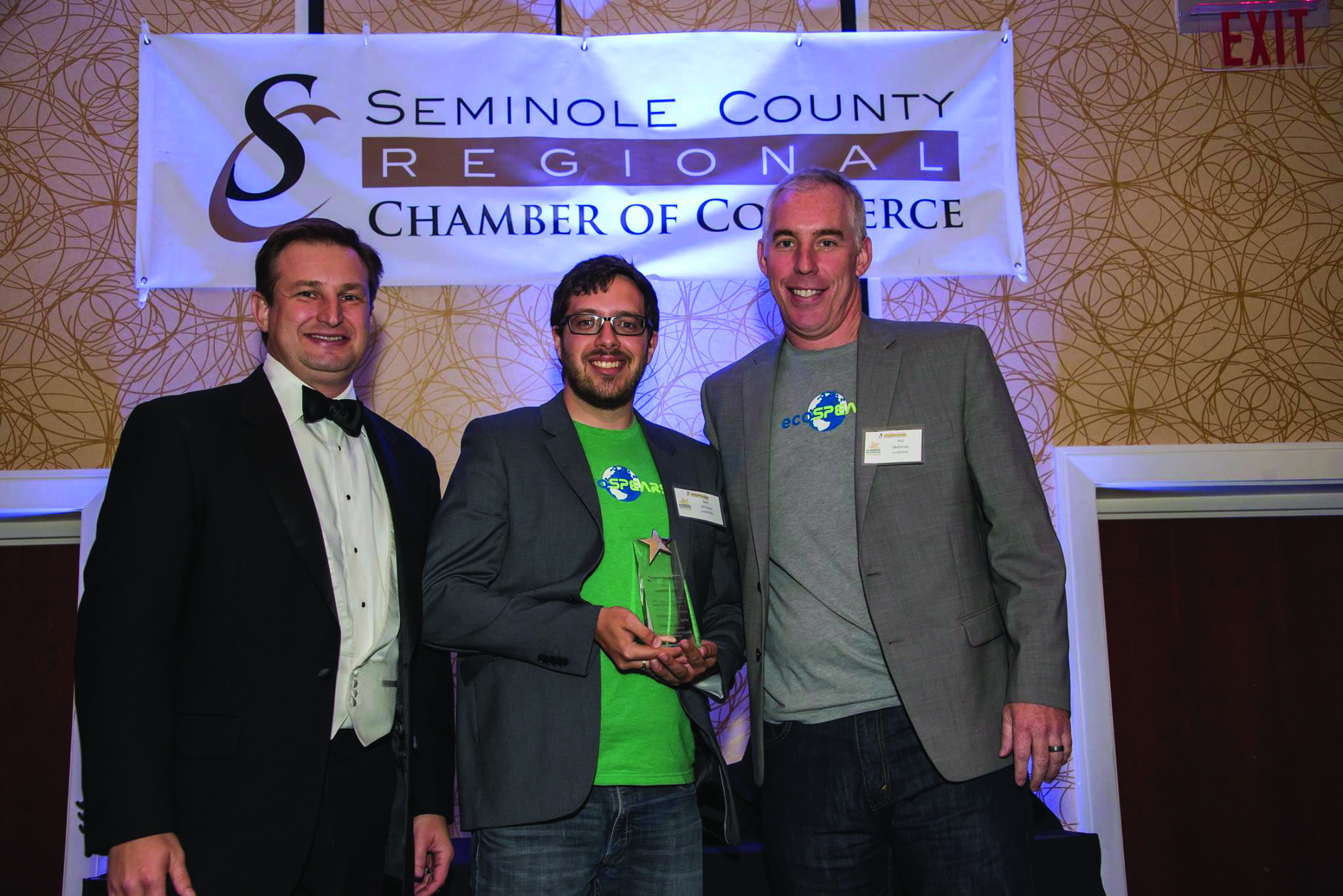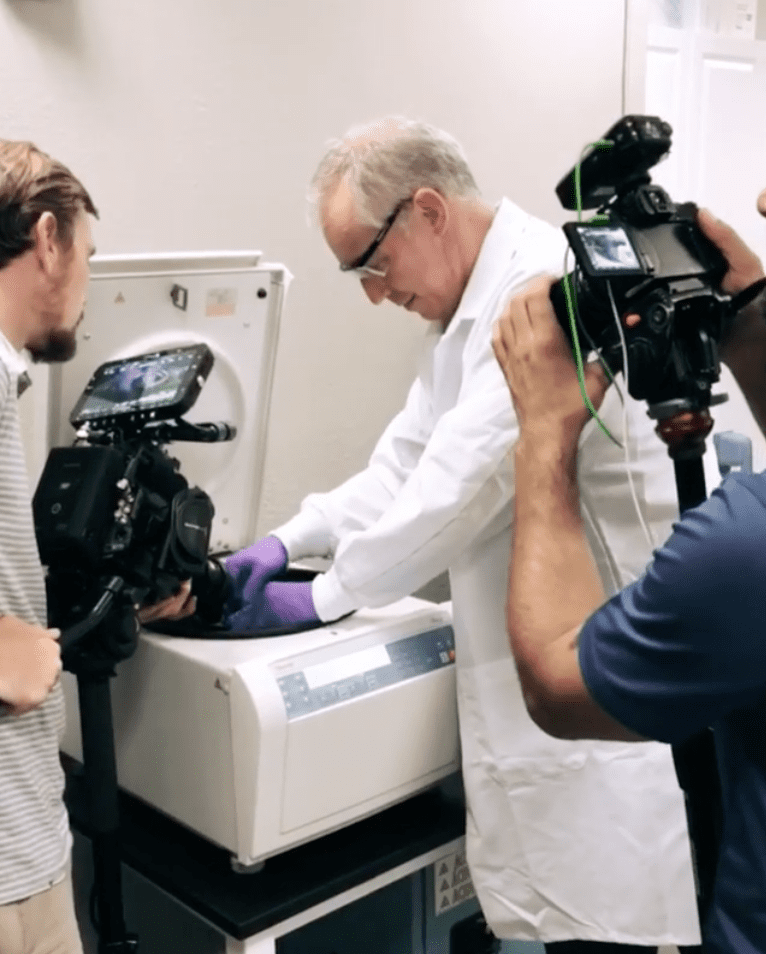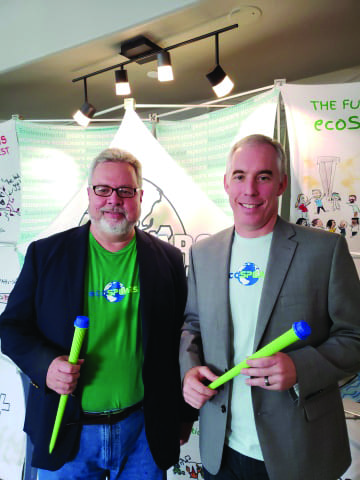In 2018, ecoSPEARS was the only privately-owned company chosen by the Agency for Toxic Substances and Disease Registry to implement its Community Redevelopment Toolkit for environmentally-impacted
communities.

Sam Johnson, Business Analyst, and Dr. Phil Maloney, Principal Scientist, accepts ecoSPEARS’s winning trophy for ‘Small Business with 6-10 Employees’ during the Seminole Business Awards ceremony in August 2018.

ecoSPEARS obtained an exclusive license for the NASA-patented SPEARS technology in 2017. Front Row: R. Ian Doromal (EVP – ecoSPEARS), Kelvin Manning (Associate Director – NASA-KSC), Sergie A. Albino (President & CEO – ecoSPEARS; Barbara Brown (Chief Technologist – NASA-KSC), Josephine Burnett (Director of the Exploration Research and Technology Programs Directorate – NASA-KSC), Robert DeVor, Ph.D. (SME II – NASA-KSC), Jacqueline W. Quinn, Ph.D. (Environmental Engineer/Resource Prospector Payload Project Manager – NASA-KSC); Back Row: James Nichols (Technology Licensing Manager – NASA-KSC), Carolyn Mizell (Chief of Research and Technology Management Office – NASA-KSC), Phillip Maloney, Ph.D. (Scientist IV – NASA-KSC), Lewis wParrish (Senior Technology Transfer Specialist – NASA-KSC) (Photo: Business Wire)
ELEVATOR PITCH
Just a Quick Note:
InnovationsOfTheWorld.com has partnered with Trade License Zone (TLZ) to support global innovators looking to expand internationally. Take advantage of the UAE’s Free Zones—enjoy streamlined setup, low corporate taxes, and a strategic gateway to the Middle East and beyond.
Get Your UAE Free Zone License Fast & Easy!ecoSPEARS is a cleantech company utilizing NASA-patented green remediation technology for the permanent extraction and destruction of environmental contaminants from North America’s polluted waterways. ecoSPEARS focuses on cost-effective, eco-friendly, and non-disruptive solutions to remove toxins from the environment and destroy them – FOREVER.
ecoSPEARS envisions a world where everyone has access to clean drinking water. Despite the world being roughly 70% water, less than one-third of that is freshwater fit for human consumption. Of that amount, less than 1% of freshwater is accessible. By giving North America’s waterways a second lease on life by permanently removing and destroying the world’s most persistent and harmful environment contaminants, ecoSPEARS’ team, technology, and solutions can finally provide a clean, sustainable, and green alternative for the Environmental Cleanup industry while simultaneously protecting human health and public safety to ensure better water and a better future.

Dr. Phil Maloney, Principal Scientist, co-discoverer of the SPEARS technology assesses ecoSPEARS technology at their in-house lab

Dr. Phil Maloney, Principal Scientist, and Sergie Albino, Co-Founder/CEO, pose with ecoSPEARS’s namesake NASA-patented technology, the Sorbent Polymer Extraction and Remediation System (SPEARS).

John Omana, VP of Operations, and Dr. Phil Maloney, Principal Scientist, post with the SPEARS technology at the eco- SPEARS office in 2018.
COMPANY AND INNOVATION
In 2014, a study performed and published by the United States Environmental Protection Agency (US EPA) found that 94% of fish tissue sampled throughout US waterways contained toxic polychlorinated biphenyls (PCBs) unsafe for human consumption. PCBs and other chlorinated environmental toxins (e.g., DDT, dioxins) are destructive man-made compounds that do not degrade naturally and persist in the environment. PCBs were manufactured throughout 1929-1977 for use in electrical appliances, transformers, paints, and caulks due to their ability to act as a fire retardant; however, PCB manufacturing was banned by the US in 1979 after numerous studies found that PCB exposure poses a variety of adverse health effects to human health and wildlife. Since the 1980s, the two most prominent and widely-accepted methods used for removing PCBs from the environment by EPA and other federal agencies are dredging and capping. Dredging involves using heavy machinery to remove PCB-contaminated sediments while destroying the river and lake bottoms, while capping involves placing a layer of soil and carbon over the contamination hotspot in order to prevent future potential spread of the contaminated material. Neither method is a sustainable practice, and both are extremely costly, time-consuming, destructive to the environment, and disruptive to communities afflicted by environmental contamination.
ecoSPEARS is disrupting the status quo of environmental remediation by providing green and sustainable technological solutions for the remediation of contaminated soils, sediments, and groundwater. Although PCBs were banned in 1979, studies estimate that some 67% of PCBs ever released into the environment remain in sediments and waterways, contaminating their surroundings, and making PCBs the most wide-spread man-made contaminant in the world. PCB removal and destruction are heavily-regulated processes that often involving dozens (or more) individuals, stakeholders, and organizations spending millions – if not billions – of dollars across years to plan, design and implement PCB remediation efforts. By obtaining an exclusive license to the NASA-patented Sorbent Polymer Extraction And Remediation System (SPEARS) technology for PCB-contaminated sediments, as well as inventing several new technologies for removing PCB contamination in soil and groundwater, ecoSPEARS is able to offer its clients as well as communities affected by PCB contamination a cleaner, green solution that is cost-effective rather than cost-prohibitive, minimally invasive to the environment, and undisruptive to the community. ecoSPEARS also developed the Reductive Integrated Destruction System (RIDS), which is a green, cost-effective chemical dehalogenation process that is able to safely destroy toxic chlorinated contaminants such as PCBs.














